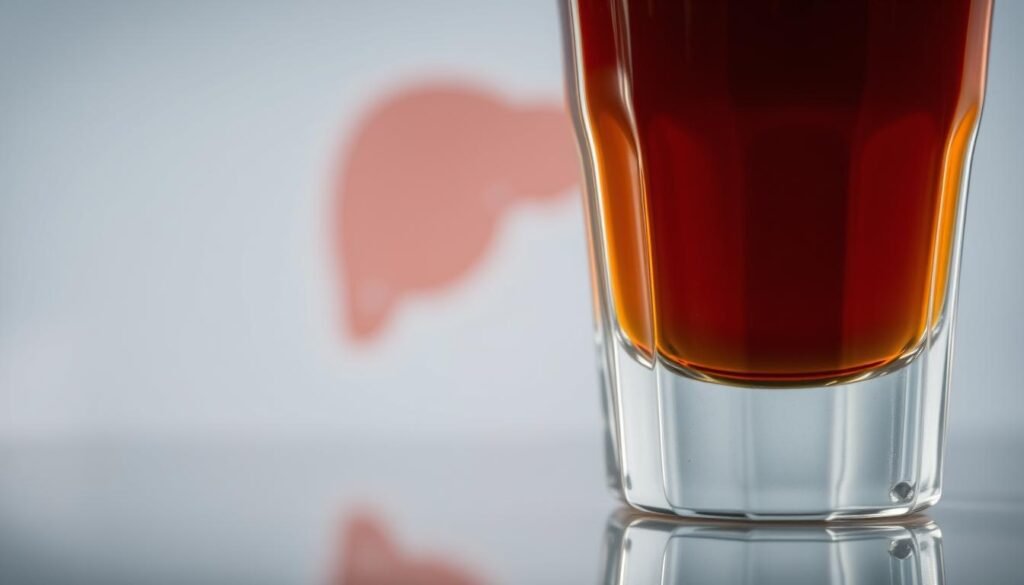Did you know about 4.5 million U.S. adults suffer from liver disease? This condition claims approximately 57,000 lives every year in the United States. The liver is our largest internal organ and is key in filtering toxins and keeping us healthy. Sadly, liver disease often goes unnoticed until it’s quite advanced. That’s why spotting the 14 signs of liver damage early is vital. Knowing these signs can lead to early treatment and better chances of recovery.
Hepatitis, cirrhosis, and fatty liver disease are various conditions that affect the liver. They might share symptoms with other illnesses. That makes knowing what to look for crucial. Recognizing these symptoms early can save lives by enabling prompt treatment.
Key Takeaways
- Approximately 1.8% of U.S. adults have liver disease.
- Liver disease causes about 57,000 deaths in the U.S. annually.
- Recognizing early warning symptoms is critical for timely medical intervention.
- Liver disease affects men twice as often as women.
- Common causes include infections, alcohol use, and obesity.
- Awareness of symptoms can help prevent severe complications related to liver disease.
Understanding the Importance of Liver Health
The liver is key in keeping us healthy. It detoxifies, makes proteins, and aids digestion. Knowing how important your liver is can help you live a better, longer life. A healthy liver filters toxins, helps with nutrient metabolism, and supports many bodily processes.
The Role of Lifestyle in Liver Health
What you do every day affects your liver. Diet, exercise, and the use of substances have big impacts. Drinking too much alcohol, eating poorly, and not being active can harm your liver. This can lead to diseases like fatty liver and cirrhosis.
Eating well and staying active are good for your liver. A diet full of fruits, veggies, lean proteins, and grains is best. Exercise helps by keeping blood flowing and lowering fat in the liver.
By making smart choices, you can lower your risk of liver problems. Knowing about diseases like Hepatitis B and C helps you avoid them. Taking care of your liver means you might avoid serious issues like liver cancer or sudden liver failure.
What Causes Liver Damage?
Liver damage comes from different factors that harm health. Too much alcohol can lead to related liver disease. Overweight individuals may develop non-alcoholic fatty liver disease because of excess fat in the liver. Hepatitis and prolonged alcohol misuse also pose threats to liver health.
Genetic conditions play a role in liver disease. For example, haemochromatosis causes iron buildup in the liver due to inheritance. Diseases like primary biliary cholangitis come from immune system issues. It’s key to know these risks for prevention.
Major factors include obesity, undetected hepatitis, and excess alcohol. Lifestyle changes, such as keeping a healthy weight and drinking less, lower liver disease risks. Vaccinations against hepatitis A and B can further protect those at risk.
| Liver Damage Cause | Associated Risk Factors |
|---|---|
| Excessive Alcohol Consumption | Alcohol-related liver disease |
| Obesity | Non-alcoholic fatty liver disease |
| Viral Infections | Hepatitis A, B |
| Genetic Conditions | Haemochromatosis |
| Immune System Issues | Primary biliary cholangitis |
Paying attention to healthcare and noticing signs of liver trouble early is crucial. Early symptoms must be taken seriously with over 100 liver diseases identified. Making wise health decisions is essential for liver well-being.
14 Signs Liver Damage
It’s key to spot liver damage early. If your liver isn’t working right, you’ll start to see signs. Catching these early helps avoid bigger health issues later. Let’s look at signs that your liver might be in trouble.
Common Symptoms of Liver Dysfunction
There are different signs that your liver is struggling. Some key symptoms are:
- Jaundice: Your skin and eyes turn yellow because bilirubin levels are high.
- Fatigue: Feeling super tired all the time, even after resting.
- Nausea: Feeling sick or queasy a lot.
- Abdominal pain: Pain or discomfort in the upper right belly.
- Dark urine: Urine looks brownish because bilirubin is high.
Each symptom could be a hint of liver damage. Knowing them can help you act fast.
The Role of Lifestyle in Liver Health
What you do every day impacts your liver. Bad habits can make liver issues worse. So catching problems early is crucial. Important things to consider include:
- Diet: Eating well helps your liver work better.
- Exercise: Staying active helps keep your liver healthy by managing weight.
- Alcohol consumption: Drinking less or not at all helps avoid liver problems.
- Medication use: Be careful with medications, like acetaminophen, as too much can hurt your liver.
Staying informed and making smart choices is key for liver health. Even small changes can make a big difference.
| Signs of Liver Damage | Impact on Health |
|---|---|
| Jaundice | Indicates liver’s inability to process bilirubin. |
| Fatigue | Reflects the liver’s diminished capability to produce energy. |
| Nausea | Associated with liver’s compromised detoxification process. |
| Abdominal Pain | Often signals liver inflammation or enlargement. |
| Dark Urine | Suggests potential liver dysfunction due to toxin build-up. |
Jaundice: The Yellow Flag
Jaundice is a key sign of liver disease. It shows up when the liver isn’t working right. The skin and eyes turn yellow because of too much bilirubin. Bilirubin is a waste product from the breakdown of red blood cells. A healthy liver usually handles bilirubin without a problem. But with liver issues, jaundice symptoms start showing because the liver can’t deal with bilirubin well.
When bilirubin levels in the blood go over 3 mg/dL, jaundice becomes visible. Patients might also have pale stools and dark urine. Around 20% of newborns get jaundice in their first week. This happens because their livers are not fully developed yet. Not just babies, but older people can have jaundice too. It shows that jaundice affects people of all ages.
Many things can cause jaundice. Liver diseases like Hepatitis C are common causes. Some medications, such as antibiotics like Augmentin, can also lead to jaundice. People with genetic problems like hemochromatosis or Wilson’s disease might have liver issues too. Knowing about jaundice symptoms is important. It helps keep an eye on liver health.
| Characteristic | Normal Range | Jaundice Level |
|---|---|---|
| Bilirubin (mg/dL) | Less than 1 | Exceeds 3 |
| Occurrence in Newborns | 20% | Common |
| Occurrence in Elderly | N/A | Common |
| Associated Conditions | N/A | Hepatitis, Genetic Disorders, Drug Reactions |

Fatigue: A Persistent Warning Sign
Fatigue is a common early sign of liver issues but often ignored. People with liver dysfunction feel very tired. This tiredness might be a clue to more serious health problems. The liver, when not working well, can’t filter toxins or manage energy. So, exhaustion could be mistaken for normal tiredness from day-to-day activities.
Lifestyle choices affect liver health a lot. Drinking too much alcohol, eating poorly, and not exercising are harmful. These behaviors can lead to liver diseases. Without changes, there’s a high risk of getting really sick, like getting cirrhosis or liver cancer.
Noticing ongoing fatigue is important. It might make people think about their liver health. Knowing symptoms is key for early help and treatment. Life is tiring, but constant tiredness from liver issues shouldn’t be ignored. It’s crucial for staying healthy.
| Factor | Impact on Liver |
|---|---|
| Excessive Alcohol Consumption | Can lead to alcoholic liver disease, cirrhosis, and liver cancer. |
| Poor Diet | Increases risk of non-alcoholic fatty liver disease and obesity, worsening liver health. |
| Lack of Exercise | Contributes to weight gain and can exacerbate liver diseases. |
| Obesity | Linked to increased liver inflammation and fatty liver disease. |
| Chronic Conditions (Diabetes, High Cholesterol) | Exacerbate liver dysfunction and related symptoms. |
Nausea and Loss of Appetite
Knowing liver nausea signs is key for keeping an eye on liver health. Appetite loss in liver disease can show there are serious issues. These signs often come from the liver’s struggle to make bile, which we need to digest food.
As liver disease gets worse, so do nausea and loss of appetite. It’s crucial to notice these signs early. They might mean you need to see a doctor soon. Catching liver problems early can help stop them from getting worse. For info on noticing these signs, click here.
Realizing how nausea and losing your appetite are linked to liver health is important. Knowing about these early signs is key. It makes it clear why it’s vital to get medical advice soon. This could help prevent serious liver disease issues.
Abdominal Pain: A Clear Indicator
Abdominal pain is a big warning sign for liver issues. It often means there’s swelling or inflammation in the liver. This kind of discomfort might mean the liver isn’t working right. If you ignore this pain, especially with other liver issues, it might get worse.
It’s important to know how stomach pain relates to liver health. Diseases of the liver can make your abdomen hurt. Things like infections, drinking too much alcohol, and being overweight contribute to liver problems. When your belly hurts, it could mean there’s a serious liver issue that needs to be checked out soon.
Spotting symptoms early, like stomach pain, losing your appetite, and feeling tired, is key. Even if the pain comes and goes, don’t ignore it. If you have these signs, see a doctor right away. Doing so can help stop the damage and start getting better.
Dark Urine: What Does It Mean?
Dark urine can be a sign of health problems, especially with the liver. When the liver isn’t working right, dark urine may appear. It’s crucial to understand what dark urine liver symptom means for liver health.
Connection to Liver Function
Urine color tells us a lot about liver health. Dark urine often means there’s a lot of waste, like bilirubin, not being processed right because the liver is struggling. Conditions like hepatitis or cirrhosis could be causing this.

Sometimes, dark urine happens if you’re dehydrated or eat certain foods or medicines. But if it stays dark and you feel sick with jaundice, stomach pain, or tiredness, see a doctor right away.
| Urine Color | Possible Causes |
|---|---|
| Dark Orange or Amber | Dehydration, Liver Dysfunction |
| Cola-Colored | Increased Bilirubin, Liver Disease |
| Brown | Kidney Issues, Liver Dysfunction |
| Pale Stools | Impaired Biliary Drainage |
| Black Tarry Stools | Gastrointestinal Bleeding, Advanced Liver Disease |
Keeping an eye on urine color can help spot liver issues early. Knowing about the dark urine liver symptom is crucial, especially if you drink a lot of alcohol or already have health issues. Acting early can lead to better chances at stopping serious liver diseases.
Swollen Abdomen: Causes and Concerns
A swollen abdomen often indicates health problems, especially with liver issues. Ascites, or fluid retention, is common when the liver fails. This is typically seen in severe liver conditions like cirrhosis. It leads to a swollen belly and discomfort.
Fluid Retention and Its Impact
Liver damage is a major reason for fluid retention. A failing liver causes fluid build-up in the abdomen. This swelling is not just uncomfortable. It also signals serious health issues that need a doctor’s check-up.
It’s vital to know how to handle swollen abdomen liver disease. Treatments include:
- Salt restriction in the diet
- Diuretics to remove extra fluid
- Procedures to drain the fluid for comfort
- Using advanced devices like the alfapump for fluid control
A healthcare provider should check you quickly to find and stop complications. For more on ascites, click this link.
Easy Bruising: A Telltale Sign
Easy bruising can signal liver problems. People might bruise easily from small bumps. This happens because the liver can’t make enough clotting factors, crucial for blood thickening. As liver damage gets worse, bruising and bleeding become more common.
About 30 million people in the U.S. have liver disease. Signs include skin turning yellow, pale stools, dark urine, and feeling really sick. Bruising easily is one of these signs, showing it’s time to check on liver health.
Noticing bruises easily should make people think about their health and way of living. If you see bruises and have other liver issues, see a doctor quickly. They can check you and suggest ways to get better.

| Symptom | Description |
|---|---|
| Easy Bruising | Increased tendency to bruise easily due to impaired clotting factor production. |
| Yellowing Skin | Indicates potential liver dysfunction or bile flow blockage. |
| Dark Urine | Can suggest bile in urine due to liver issues. |
| Light-Colored Stools | May indicate problems with bile production and liver function. |
| Fatigue | Persistent tiredness often linked to liver health. |
Unintended Weight Loss: A Serious Symptom
Unintended weight loss could signal liver health issues. It often results from factors like lost appetite and not getting enough nutrients. If you see weight loss symptoms, it may mean liver problems that need quick doctor visits.
People might find they’re losing weight without trying. This sudden change may point to liver problems or other health issues. The liver not working right could cause nutrient loss and weight drop. Early spotting of these signs can help find liver diseases sooner.
Getting regular check-ups is key for keeping an eye on liver health. Risk of liver disease goes up with too much alcohol, certain meds, or poor diet. While unexpected weight loss isn’t always bad, it shouldn’t be ignored since it might show a deeper issue.
| Symptom | Possible Causes |
|---|---|
| Unintended Weight Loss | Loss of appetite, malabsorption, metabolic issues, liver disease |
| Fatigue | Liver dysfunction, anemia, chronic disease |
| Nausea | Liver damage, medication side effects, infections |
| Abdominal Pain | Enlarged liver, liver inflammation, fibrosis |
Watching weight loss symptoms and other liver health signs helps in tackling liver disease early. Regular health checks and a healthy lifestyle are vital in staying well and preventing big health problems.
Conclusion
Everyone needs to know about liver health. Finding liver damage early can make treatment more effective. It’s vital to recognize signs like jaundice, tiredness, and stomach pain. These could point to bigger health issues.
Living a healthy life is key for keeping your liver working right. Drinking less alcohol, staying away from harmful substances, and eating well help a lot. Regular doctor visits and acting fast when you notice symptoms can stop liver disease from getting worse. This means you can avoid serious problems like cirrhosis and liver cancer. You can learn more about keeping your liver healthy from this informative guide.
By knowing more about liver health, we not only help ourselves but also our community. If we all take steps to prevent liver disease, we can lower the chances of liver issues. This leads to a healthier, happier life for everyone.